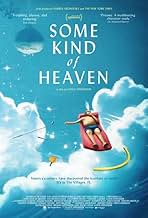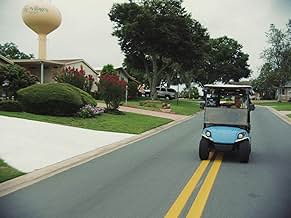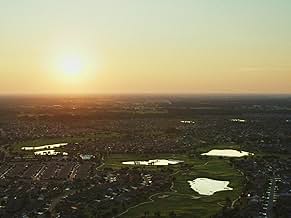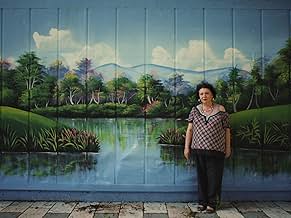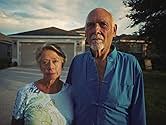Some Kind of Heaven
- 2020
- 1 h 23 min
AVALIAÇÃO DA IMDb
7,2/10
3,9 mil
SUA AVALIAÇÃO
Atrás das portas de uma terra de fantasia coberta de palmeiras, quatro moradores da maior comunidade de aposentados da América lutam para encontrar conforto e significado.Atrás das portas de uma terra de fantasia coberta de palmeiras, quatro moradores da maior comunidade de aposentados da América lutam para encontrar conforto e significado.Atrás das portas de uma terra de fantasia coberta de palmeiras, quatro moradores da maior comunidade de aposentados da América lutam para encontrar conforto e significado.
- Prêmios
- 2 vitórias e 10 indicações no total
Avaliações em destaque
As I anticipate my coming milestone birthday, the big seven-oh, I for some weird reason decided to watch Some Kind of Heaven. I guess I am curious about how different people handle the challenge of ageing gracefully. Well, now I kind of wish I hadn't watched it as it left me feeling pretty depressed.
But I think it's because of the way the film was done, i.e., the characters the writer and/or director chose to focus on. Two of the women just seemed so sad it was awful. A couple of the men, too, were struggling. I'm thinking now that the film's producers should have included a character or two who were actually happy, just for balance.
Interestingly, though, the people who seemed the most troubled - Reggie and Anne, and Dennis, had histories that preceded and led up to their current troubled states shown in the film. I guess one of the conclusions one can draw from the film is that you carry your problems with you, i.e., a change of venue doesn't solve the deeper issues.
Bottom line: it was very well done but I would have liked more information about each character as well as about the place itself. Also, I wish there had been at least one resident who was content.
But I think it's because of the way the film was done, i.e., the characters the writer and/or director chose to focus on. Two of the women just seemed so sad it was awful. A couple of the men, too, were struggling. I'm thinking now that the film's producers should have included a character or two who were actually happy, just for balance.
Interestingly, though, the people who seemed the most troubled - Reggie and Anne, and Dennis, had histories that preceded and led up to their current troubled states shown in the film. I guess one of the conclusions one can draw from the film is that you carry your problems with you, i.e., a change of venue doesn't solve the deeper issues.
Bottom line: it was very well done but I would have liked more information about each character as well as about the place itself. Also, I wish there had been at least one resident who was content.
This documentary is very interesting. It has the best cinematography I've ever seen in a documentary and it covers quite a serious subject with respect.
This documentary follows four residents of The Villages, a massive retirement home in Florida - Anne and Reggie, a married couple; Barbara, a widow; and Dennis, a man who doesn't actually live at The Villages. Anne struggles with her marriage, due to Reggie's drug addiction and worsening mental health. Barbara's husband died four months before filming and she is nervous about dating again. Dennis lives in his van, and hangs around The Villages in hopes of finding a wealthy woman in his last few years.
Before this film, I had never heard of The Villages. I found the story of its residents fascinating. The Villages is often referred to as "The Disneyworld for Retirees," and when you hear that, you imagine a perfect place to spend the later part of your life. The problem with utopias is that they're basically impossible. And the goal of the film is to showcase that The Villages is not a perfect utopia. It follows the struggles of these four people and how they can't just escape their pain with tennis or acting classes. One thing I like about this film is that it doesn't come off as malicious. It's not trying to expose The Villages for being a place of fake happiness or mock the residents or anything like that. Instead I got the impression that the director wanted to tell a story about real people trying to cope with their problems and I can respect that.
The cinematography is one of the stand-out aspects of this film. Every shot looks staged, as if they were from a typical fiction movie. There's a surprising amount of close-ups for a documentary. It was to the point that I didn't actually believe I was watching a documentary at first. I'm very impressed with the cinematography - shout-out to David Bolen, the cinematographer.
There is a lot to learn from this film. Life is full of pain and struggles; and, as sad as it may sound, that's inescapable. It's impossible to always be happy, even in the utopic Disney World for Retirees.
I give this film 4 out of 5 stars and recommend it for ages 12 to 18. It comes out January 15, 2021. Reviewed by Calista B., KIDS FIRST!
This documentary follows four residents of The Villages, a massive retirement home in Florida - Anne and Reggie, a married couple; Barbara, a widow; and Dennis, a man who doesn't actually live at The Villages. Anne struggles with her marriage, due to Reggie's drug addiction and worsening mental health. Barbara's husband died four months before filming and she is nervous about dating again. Dennis lives in his van, and hangs around The Villages in hopes of finding a wealthy woman in his last few years.
Before this film, I had never heard of The Villages. I found the story of its residents fascinating. The Villages is often referred to as "The Disneyworld for Retirees," and when you hear that, you imagine a perfect place to spend the later part of your life. The problem with utopias is that they're basically impossible. And the goal of the film is to showcase that The Villages is not a perfect utopia. It follows the struggles of these four people and how they can't just escape their pain with tennis or acting classes. One thing I like about this film is that it doesn't come off as malicious. It's not trying to expose The Villages for being a place of fake happiness or mock the residents or anything like that. Instead I got the impression that the director wanted to tell a story about real people trying to cope with their problems and I can respect that.
The cinematography is one of the stand-out aspects of this film. Every shot looks staged, as if they were from a typical fiction movie. There's a surprising amount of close-ups for a documentary. It was to the point that I didn't actually believe I was watching a documentary at first. I'm very impressed with the cinematography - shout-out to David Bolen, the cinematographer.
There is a lot to learn from this film. Life is full of pain and struggles; and, as sad as it may sound, that's inescapable. It's impossible to always be happy, even in the utopic Disney World for Retirees.
I give this film 4 out of 5 stars and recommend it for ages 12 to 18. It comes out January 15, 2021. Reviewed by Calista B., KIDS FIRST!
This documentary has been on my list for around 3 years, and I'm so glad I finally got down to watching it. I am only 20 years old, but this film really resonated with me. It was a mind-opening experience that plunged me further into my existential crisis, and which reaffirmed something that I had been in denial of- that nothing stays the same, and that I need to accept this as a fact and eventually embrace it. Though I did appreciate the beauty in this film, it did scare me, and I'm sure I'll be thinking about it and the concept of death further down the road- which is, of course, bittersweet, but a needed intervention.
Some Kind of Heaven is a documentary that takes place in The Villages, a huge retirement community in central Florida. As a Floridian, I am very familiar with The Villages and its reputation as a geriatric "party central". Billboards all along I-75 advertise the good times and good life to be had there. So I was especially interested in how life at The Villages would be portrayed in this film. On the surface, it seems like it might actually be "some kind of heaven." There are dozens of golf courses, swimming pools, lovely little homes on well-maintained streets, shopping centers, banks - it's a community you never have to leave if you don't want to. Every day presents the opportunity to join in on social activity, take up a new hobby, or simply ride around in a customized golf cart. But we quickly get underneath the happy surface as the documentary focuses in on the lives of four residents for whom The Villages hasn't quite lived up to the dream.
Anne and Reggie have been married for 47 years, and looked forward to a happy retirement life. But Reggie got lost somewhere along the way, both to dementia and to the pursuit of drugs. It is up to Anne to try to bring him back, and help him out of a drug charge he finds himself facing. David is not actually a resident of The Villages, but lives in his motor home and is cruising around the community looking for a woman who will let him move in with her. He is running out of money and needs to find someone quickly. Barbara is a widow who moved to The Villages from Massachusetts with her husband, who died shortly afterwards. She is lonely, longing to move back home, but can't afford to relocate. She is the only one of the four who is still working, holding down a full-time job at the community rehab center.
Cinematographer David Bolen does an excellent job of portraying the dichotomy between the image of this community and the reality being experienced by some of its residents. We see sweeping views of beautiful sunsets, pristine golf courses, and large outdoor party areas filled with twinkling lights and seemingly happy retirees. Then the camera focuses on someone like Barbara, cautiously approaching the dance floor and dancing by herself. We see people talking and laughing in their homes, and then David trying to sleep on the cramped couch in his motor home. We switch back and forth between Reggie having a strange drug trip on the golf course and Anne back at home decorating their house for their wedding anniversary. The themes of longing and disillusionment become clearer with each new challenge encountered by our four main characters.
There is some welcome humor to the film as well. The dance classes, drama lessons, synchronized swimming sessions and similar forms of entertainment make us laugh. David's antics in finding a woman keep us chuckling at his audacity. But these moments also also make us wonder what really constitutes happiness. How many new activities do we need to feel good about ourselves and believe we are living the life we worked so hard for throughout our lives? Do these activities give us joy and fulfillment or just help us pass the time? Is there something else that makes life worth living? Director Lance Oppenheim does an admirable job of bringing those questions to the forefront as we consider the irony of unfulfilled desire in the midst of the "Disneyland of retirement". I walked away from the film with a sadness for the people who seemed to be just filling empty hours with no greater sense of purpose or meaning.
Oppenheim clearly made his point about his character's disconnect with the life they expected at The Villages. However, he could have could have taken this message even further. It would have been interesting to know how many other residents found this life less than satisfying, or to hear more from those for whom it had fulfilled all their dreams. Are there more people like these four residents, or are they just outliers? My sense is that their views are more common than the promoters of The Villages would like to admit. Finding out whether this was true would make this film an even more useful commentary on the aging population in our country.
Anne and Reggie have been married for 47 years, and looked forward to a happy retirement life. But Reggie got lost somewhere along the way, both to dementia and to the pursuit of drugs. It is up to Anne to try to bring him back, and help him out of a drug charge he finds himself facing. David is not actually a resident of The Villages, but lives in his motor home and is cruising around the community looking for a woman who will let him move in with her. He is running out of money and needs to find someone quickly. Barbara is a widow who moved to The Villages from Massachusetts with her husband, who died shortly afterwards. She is lonely, longing to move back home, but can't afford to relocate. She is the only one of the four who is still working, holding down a full-time job at the community rehab center.
Cinematographer David Bolen does an excellent job of portraying the dichotomy between the image of this community and the reality being experienced by some of its residents. We see sweeping views of beautiful sunsets, pristine golf courses, and large outdoor party areas filled with twinkling lights and seemingly happy retirees. Then the camera focuses on someone like Barbara, cautiously approaching the dance floor and dancing by herself. We see people talking and laughing in their homes, and then David trying to sleep on the cramped couch in his motor home. We switch back and forth between Reggie having a strange drug trip on the golf course and Anne back at home decorating their house for their wedding anniversary. The themes of longing and disillusionment become clearer with each new challenge encountered by our four main characters.
There is some welcome humor to the film as well. The dance classes, drama lessons, synchronized swimming sessions and similar forms of entertainment make us laugh. David's antics in finding a woman keep us chuckling at his audacity. But these moments also also make us wonder what really constitutes happiness. How many new activities do we need to feel good about ourselves and believe we are living the life we worked so hard for throughout our lives? Do these activities give us joy and fulfillment or just help us pass the time? Is there something else that makes life worth living? Director Lance Oppenheim does an admirable job of bringing those questions to the forefront as we consider the irony of unfulfilled desire in the midst of the "Disneyland of retirement". I walked away from the film with a sadness for the people who seemed to be just filling empty hours with no greater sense of purpose or meaning.
Oppenheim clearly made his point about his character's disconnect with the life they expected at The Villages. However, he could have could have taken this message even further. It would have been interesting to know how many other residents found this life less than satisfying, or to hear more from those for whom it had fulfilled all their dreams. Are there more people like these four residents, or are they just outliers? My sense is that their views are more common than the promoters of The Villages would like to admit. Finding out whether this was true would make this film an even more useful commentary on the aging population in our country.
Marriage is hard. For many people, being alone is hard. Hell, being human is hard, I don't care who you are. I was very pleased there was no talk of the politics of The Villages, but you will get the gist of the place. And if you're in the right mood to see real people caught up in the human condition , I think you'll enjoy. It stayed with me for a while.
Você sabia?
- ConexõesFeatures Os Incríveis 2 (2018)
- Trilhas sonorasThe Villages Shovelin' Sunshine Song
Written by Ted Merthe
Principais escolhas
Faça login para avaliar e ver a lista de recomendações personalizadas
- How long is Some Kind of Heaven?Fornecido pela Alexa
Detalhes
- Data de lançamento
- País de origem
- Central de atendimento oficial
- Idioma
- Também conhecido como
- Неначе в раю
- Locações de filme
- Empresas de produção
- Consulte mais créditos da empresa na IMDbPro
Bilheteria
- Faturamento bruto nos EUA e Canadá
- US$ 43.492
- Fim de semana de estreia nos EUA e Canadá
- US$ 9.820
- 10 de jan. de 2021
- Faturamento bruto mundial
- US$ 53.222
- Tempo de duração
- 1 h 23 min(83 min)
- Cor
- Proporção
- 4:3
Contribua para esta página
Sugerir uma alteração ou adicionar conteúdo ausente







